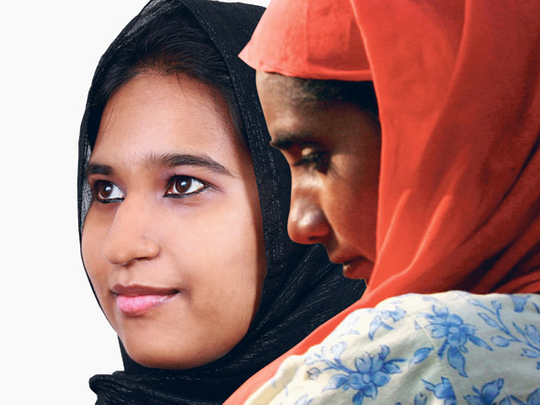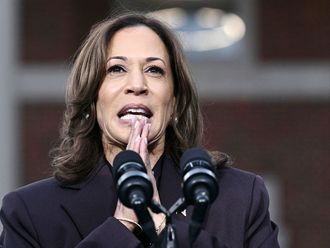
In countries like Pakistan, where women's identities are in a constant state of stressful negotiation with society, the passage of a law penalising sexual harrasment of women at the workplace is a major win.
Yet if empowerment is seen as the ability to make choices in an environment where it was not previously possible, Pakistan offers a hugely polarised landscape. A woman's experience of power shapes her ability to effect change in her world, but today the standard measure of class, or labour participation, that correlate to more empowerment, often fails.
Pakistan today is the most urbanised country in south Asia, more so than India or Bangladesh, and rapid social change, with enclaves of exception, has paradoxically brought an overall degradation in the average woman's status. Growing poverty and religious extremism have brought a dual-burden of vulnerability.
If she is an income-generator, rarely is she a decision-maker. Urban women have better access to information, but even as entrepreneurs, if not factory fodder, they have low investment capacity, even less business exposure, and remain subordinate to male peers.
In contrast, the life of a rural woman is often stereotyped as one at the bottom of the pyramid, but where commercialisation has not broken traditional structures, she still retains some degree of autonomy as compared to the faceless tribal woman, who is the least empowered in terms of making strategic choices.
Terrorism, militancy and religious extremism ravage all of society, but even at its least aggressive, its long shadow in Pakistan now defines social exclusion for women even in areas where the Taliban have been officially flushed out, such as Swat. These areas were once hospitable to women in public spaces, now as outposts to many tribal regions and agencies, they have been transformed into altered, harsher, gender-hostile realities.
In fact, according to the World Economic Forum's task force on gender disparity, Pakistan now ranks third from the bottom, 132 out of 134 countries, better only than Chad and Yemen.
But our rural and tribal areas are not the only type of terrain that is threatened by the misogyny of militant extremism. The patriarchal social mores of tribal society have seeped into our most metropolitan environments, creating sub-cultures of restriction in major cities as well.
Karachi, for instance, is now home to the largest number of semi-migrant tribal men, with higher demographics than either Kabul or Peshawar, lowering the city's social bandwidth for gender freedoms. In urban Punjab, decades of sectarian violence and state tolerance for extremist outfits has expanded the appetite for anti-women discourse and created new inhibitors where less existed. In Quetta or Peshawar, the walls close in on women and their opportunities.
Shocking statistics
A breakdown in the architecture of laws and challenges to state writ means women's rights suffer. According to human-rights lawyers, many areas of Pakistan witness a silent case of honour killing every single day; in the most populous province a woman is raped every hour. These are sobering, if not shocking, statistics.
What can then be done? The state is no match for the creeping Salafism of our society, which is used and abused for repressing and imprisoning women, but it can start to challenge this trend by investing in better governance of social programmes.
The only indicator that remains stable in most correlations to empowerment is access to education, not just access to jobs, and to a large extent, better healthcare. On an average, all those who seek to influence policy discourse in Pakistan can target traditional social indicators and Millennium Development Goal targets as indices we need to work on, and can safely invest in.
While framing new legislation is critical, as laws provide the foundation for the option of state relief or affirmative action, laws often provide for little reform on the ground if public knowledge of their utility remains obscure.
Women are unable to navigate the programmes on offer for them, or to seek relief from empowering laws because of lack of information. This is where media initiatives can actually transform the relationship of women with the state, as well as with society.
An effective case in point is an animated public service campaign run by a private channel that iterated the message that women do not have to tolerate harassment, now that the sexual harassment bill is law, and can now start reporting such incidents to the police, the courts, an ombudsman, or a mandatory committee if they work in a corporation. This is indeed a powerful message.
Yet bucking all these trends, we have empowered women like a legislator in the Punjab Assembly squandering women's rights, probably because she is oblivious of the devastating effect that existing laws on polygamy, in their easy abuse, have on the average woman in urban Pakistan.
She forgets that the strict permissions which are rightly required by the law in Pakistan, are cast aside for thousands of women every year who become half-citizens in a contractual vacuum when their husbands shed them without support, without either Islam's justice system or the state's intervention.
They remain legally ‘married', saddled with children who need regular support, and become part of the informal domestic servant class that comforts the lifestyles of other working and leisure-class women.
The good news is in the nuance. A burgeoning urban youth culture accommodates middle-class aspiration, and provides a gender-neutral public space in the media. Women are serving as role models in traditionally all-male professions.
A higher participation of women in the legislatures has redefined the agenda in parliament. In fact, the vilified reserved seats have done more in seven years for women's empowerment laws than anyone in 50 years.
Out of the 58 private member's bills moved in 2010 in the 13th National Assembly sitting, 85 per cent of the bills were moved by women on reserved seats. So some statistics do look good.
Now it is up to all of us, the executive, civil society, the media, and politicians, to chip away at the social, cultural and economic barriers preventing women from exercising power as full citizens of Pakistan. We hold up half of Pakistan's sky. No one should be allowed to take that away from us.
(The writer is a member of the National Security Committee of the National Assembly and former information minister)









